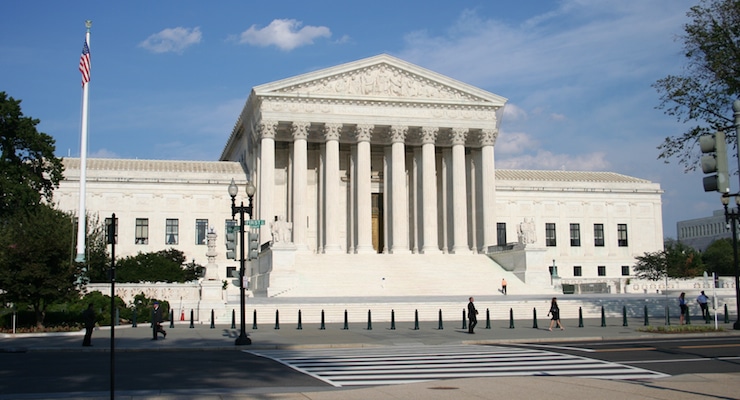

The U.S. Supreme Court (SCOTUS) building as viewed from across NE 1st Street.
The Supreme Court struck down a disputed law passed in 2002 on Monday that would have allowed Americans born in Jerusalem to list their birthplace as Israel on their U.S. passports. In a 6-3 ruling, the high court sided upheld the president’s authority in foreign affairs, claiming Congress overstepped its bounds when it passed legislation that would’ve changed the State Department’s long-standing policy.
The policy was based on the U.S. government historically refusing to recognize any nation’s sovereignty over Jerusalem until Israelis and Palestinians resolve the seemingly impossible question of sovereignty through Middle East negotiations.
“Recognition is a matter on which the nation must speak with one voice. That voice is the president’s,” Justice Anthony Kennedy wrote in his majority opinion. The ruling, which ends a 12-year-old lawsuit by a Jerusalem-born American, Menachem Zivotofsky, and his U.S. citizen parents. grants the president exclusive power to recognize foreign nations. Leading up to the conclusion, Justice Kennedy wrote the following:
In a world that is ever more compressed and interdependent,it is essential the congressional role in foreign affairs be understood and respected. For it is Congress that makes laws, and in countless ways its laws will and should shape the Nation’s course. The Executive is not free from the ordinary controls and checks of Congress merely because foreign affairs are at issue. It is not for the President alone to determine the whole content of the Nation’s foreign policy. That said, judicial precedent and historical practice teach that it is for the President alone to make the specific decision of what foreign power he will recognize as legitimate, both for the Nation as a whole and for the purpose of making his own position clear within the context of recognition in discussions and negotiations with foreign nations. Recognition is an act with immediate and powerful significance for international relations, so the President’s position must be clear. Congress cannot require him to contradict his own statement regarding a determination of formal recognition.
Justice Clarence Thomas agreed with the outcome of the case, but on narrower grounds and not based on the same legal or philosophical grounds outlined by Kennedy. For Thomas, the law didn’t meet a “Necessary and Proper” standard, nor was it solely addressing passports that fell under the Commerce Clause.
“That the President has the power to regulate passports under his residual foreign affairs powers does not, however, end the matter, for Congress has repeatedly legislated on the subject of passports.,” Justice Thomas wrote. :Because the President has residual foreign affairs authority to regulate passports and because there appears to be no congressional power that justifies §214(d)’s application to passports, Zivotofsky’s challenge to the Executive’s designation of his place of birth on his passport must fail.”
Justice Antonin Scalia read a summary of his dissent from the bench, stating the Constitution “divides responsibility for foreign affairs between Congress and the president.” Chief Justice John Roberts and Justice Samuel Alito joined the dissent.
“That is not the chief magistrate under which the American People agreed to live when they adopted the national charter,” Justice Scalia wrote in the decent. “They believed that “[t]he accumulation of all powers, legislative, executive, and judiciary, in the same hands, . . . may justly be pronounced the very definition of tyranny.” The Federalist No. 47, p. 301 (Madison)…. Under the Constitution they approved, Congress may require Zivotofsky’s passport and birth report to record his birthplace as Israel, even if that requirement clashes with the President’s preference for neutrality about the status of Jerusalem.”
The status of Jerusalem, which has been controlled by Israel since the Six-Day Wr in 1967, when an Arab coalition unsuccessfully attacked the tiny young country, has been one of the more controversial issues in the Israeli-Palestinian debate. Israel has proclaimed a united Jerusalem as its eternal capital, yet, despite their defeat, Palestinians have declared that east Jerusalem will be the capital of their non-existent independent state.
Though U.S. policy has long refrained from recognizing any nation’s sovereignty over Jerusalem, Congress has repeatedly tried to push administrations of both parties to recognize Jerusalem as Israel’s capital. Through a Republican and Democrat administration, the U.S. has never enforced the passport law.
The justices rejected Zivotofsky’s case in 2012, when they rejected lower court decisions that called the matter a political issue that should be resolved by Congress and the president without the help of the courts. The federal appeals court in Washington then struck down the law as an unconstitutional intrusion by Congress on the president’s authority over foreign affairs.
President George W. Bush signed the 2002 provisions into law, but wanted to have it both ways, as has President Obama. Bush said afterward the signing that “U.S. policy regarding Jerusalem has not changed,” and Obama has agreed.
The most damning journalistic sin committed by the media during the era of Russia collusion…
The first ecological study finds mask mandates were not effective at slowing the spread of…
On "What Are the Odds?" Monday, Robert Barnes and Rich Baris note how big tech…
On "What Are the Odds?" Monday, Robert Barnes and Rich Baris discuss why America First…
Personal income fell $1,516.6 billion (7.1%) in February, roughly the consensus forecast, while consumer spending…
Research finds those previously infected by or vaccinated against SARS-CoV-2 are not at risk of…
This website uses cookies.